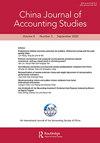混合所有制改革与国有企业去杠杆:程度与方法
Q4 Business, Management and Accounting
引用次数: 1
摘要
摘要基于2007年至2018年在上海和深圳证券交易所上市的国有企业的数据,本研究考察了混合所有制改革如何影响国有企业(以下简称国企)的去杠杆行为。我们发现,国有企业的国有股东和非国有股东之间的股权平衡程度越高,他们就越倾向于选择去杠杆。至于去杠杆的方法,他们在去杠杆过程中更倾向于选择留存收益和当期债务偿还。此外,这种影响在杠杆率过高的国有企业、低市场化地区更为明显,在中央国有企业和地方国有企业中也更为明显。我们还发现,混合所有制改革提高了去杠杆国有企业的经营业绩。研究结果表明,混合所有制改革能够以积极的方式有效地促进国有企业的去杠杆行为。本文章由计算机程序翻译,如有差异,请以英文原文为准。
Mixed-ownership reform and deleveraging of state-owned enterprises: Degree and methods
ABSTRACT Based on data of state-owned enterprises listed on the Shanghai and Shenzhen Stock Exchange from 2007 to 2018, this study examines how mixed-ownership reform affects the deleveraging behaviour of state-owned enterprises (hereafter, SOEs). We find that the higher the degree of equity balance between state-owned shareholders and non-state-owned shareholders of SOEs, the more inclined they are to choose to deleverage. As for the methods of deleveraging, they are more inclined to choose retained earnings and current debt repayment in the deleveraging process. Furthermore, this effect is more pronounced for SOEs with excess leverage, in low marketisation regions and pronounced for both centre SOEs and local SOEs. We also find that mixed-ownership reform increases deleveraging SOEs’ operating performance. The results suggest that mixed-ownership reform can efficiently promote the deleveraging behaviour of SOEs in positive ways.
求助全文
通过发布文献求助,成功后即可免费获取论文全文。
去求助
来源期刊

China Journal of Accounting Studies
Business, Management and Accounting-Business, Management and Accounting (all)
CiteScore
0.70
自引率
0.00%
发文量
19
审稿时长
6 weeks
 求助内容:
求助内容: 应助结果提醒方式:
应助结果提醒方式:


